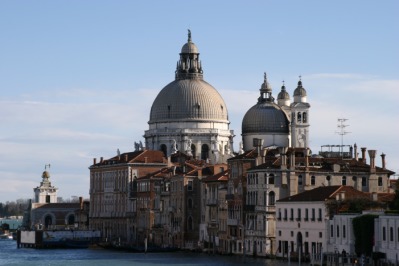Colin's Journal: A place for thoughts about politics, software, and daily life.
June 24th, 2004
Football, TV, and Mailing Lists
 Watching Euro 2004 has been a challenge because of the time difference. Most games take place while I’m at work, finishing before I even head home. The ability to view TV on my mobile phone would therefore have been a useful (although I’m sure expensive) feature. As it is I caught the 2nd half today, saw England go out on penalties, and then came home to Little Portugal where a large celebration was underway.
Watching Euro 2004 has been a challenge because of the time difference. Most games take place while I’m at work, finishing before I even head home. The ability to view TV on my mobile phone would therefore have been a useful (although I’m sure expensive) feature. As it is I caught the 2nd half today, saw England go out on penalties, and then came home to Little Portugal where a large celebration was underway.
On the techy side of things I have setup a mailing list for SimpleTAL. At the moment this list sets the gold standard in low traffic volumes: it has one subscriber (me) and no messages. If you’re looking for a place to discuss SimpleTAL and related subjects (PubTal, etc) then please subscribe.
The picture on the right was taken during the Taste Of Little Italy festival last weekend. Despite the festival being about Italy, most of the music was South American. Of the bands that I heard my favourite was a Jazz band called Project Phoenix.
June 20th, 2004
Constitution agreed
The big news this weekend, outside of the football results, was the agreement on the EU constitution. The final fudge on the voting system for the Council of Ministers came to a complex mix of rules, although there is still some logic left to them:
A qualified majority shall be defined as at least 55% of the members of the Council, comprising at least fifteen of them and representing Member States comprising at least 65% of the population of the Union.
A blocking minority must include at least four Council members, failing which the qualified majority shall be deemed attained.
I preferred the original suggestion of 50% of Members representing 60% of the population, but it is at least an improvement over the Nice rules.
The difficult part will now to be to ratify this treaty in all member states. The UK referendum campaign is going to be difficult. I still think that a yes vote can be achieved, but it is going to take a lot more work than I had originally expected.
 The arguments being put forward for rejecting the constitution have so far been fairly weak on detail, but very strong on emotion. There seems to be a significant force trying to turn the UK referendum on the constitution into one on membership of the EU. The downsides of leaving the EU are significant, and the benefits mostly nonexistent. Access to the common market (essential to the UK economy) requires non-member countries to implement most EU laws anyway, but only membership allows significant influence over those laws.
The arguments being put forward for rejecting the constitution have so far been fairly weak on detail, but very strong on emotion. There seems to be a significant force trying to turn the UK referendum on the constitution into one on membership of the EU. The downsides of leaving the EU are significant, and the benefits mostly nonexistent. Access to the common market (essential to the UK economy) requires non-member countries to implement most EU laws anyway, but only membership allows significant influence over those laws.
Those campaigning to reject the constitution, and yet retain membership of the EU, are also ignoring the downsides and over stating the benefits. The constitution contains many good elements that would be lost with a rejection. The areas of EU legislation that the parliament can examine and change is greatly expanded in the constitution. The use of qualified majority voting (QMV) across more areas will make getting agreement on issues easier.
Rejection would leave the EU functioning as it does today. The issues that are currently not subject to QMV (such as Asylum and Immigration) would still need to be tackled, but the results would take longer to achieve. Democratic control of the EU would be as weak as it is now, and while the constitution isn’t exactly light reading, it is still easier to understand than the current set of treaties.
June 16th, 2004
The great weblogs.com disapearing act
The news that around 3000 blogs hosted on weblogs.com have been taken off the ‘net is causing much consternation. The reason for the outage is not entirely clear. The transcript of an audio post made by Dave Winer explains that Userland used to host the site. Changes in management meant that they were no longer willing to do this, and Dave offered to host weblogs.com on his own servers.
 Up to this point it makes sense. It seems however that Dave didn’t inform the users of weblogs.com that there was going to be a server migration. He also didn’t perform any operational readiness testing on the new server to see whether it could handle the load of hosting weblogs.com. This is understandable to some degree – Dave after all was not doing this on a commercial basis.
Up to this point it makes sense. It seems however that Dave didn’t inform the users of weblogs.com that there was going to be a server migration. He also didn’t perform any operational readiness testing on the new server to see whether it could handle the load of hosting weblogs.com. This is understandable to some degree – Dave after all was not doing this on a commercial basis.
The strange part is what happened next. Normally when a server migration such as this fails you revert back to the old server, in this case run by Userland. The end users could then have been given a couple of months to locate new hosting and take backups of their sites. Why didn’t Userland do this? Why, after four years of offering this free service, was it not possible to extend service by a couple of months?
It pays to be wary of trusting your data to hosted services. A year ago my dad’s ISP offered a web-based diary application on their portal. It seemed like a neat way of maintaining a diary while travelling. The snag was that the diary had no export function. You could maintain your diary for as long as you were a subscriber to the ISP, and after that your data would be lost.
If you value your hosted data then take backups. Even on well run services such as LiveJournal there is always the possibility of logging in one day to find all of your posts have vanished.
June 13th, 2004
EU election results
Prior to the European elections it was expected that turnout in the UK would be the lowest ever. In practise the actual turnout was the highest ever at 39%. Meanwhile across Europe as a whole the turnout fell to an all time low of 45%.
 The large turnout in the UK, not surprisingly, corresponded with the UK Independence Party marginally beating the Liberal Democrats to third place.
The large turnout in the UK, not surprisingly, corresponded with the UK Independence Party marginally beating the Liberal Democrats to third place.
The news certainly isn’t good for those who, like myself, want to see the UK retain membership of the EU. The best I can hope for is that the success of the UKIP may provide a wakeup call to pro-EU politicians.
As I’ve noted before, governments are keen to blame unpopular but necessary legislation on the EU, despite those same governments being the ones that approve them at the EU level. Conversely EU legislation and initiatives that many people would agree with are played down or badly presented.
June 7th, 2004
Minor updates.
I’ve not achieved a great deal in the last week. There’s been socialisation, movie watching, and over the weekend some photography. Nothing earth shattering (you’d have noticed).
 I bought a couple of books on photography: “National Geographic Photography Field Guide” and John Hedgecoe’s “The new manual of Photography”. I’m only part way through through the first of these, and so far its been an interesting read.
I bought a couple of books on photography: “National Geographic Photography Field Guide” and John Hedgecoe’s “The new manual of Photography”. I’m only part way through through the first of these, and so far its been an interesting read.
I had some prints developed on Thursday/Friday from a small shop called Korner Color. They managed to print half of them as is, but unfortunately they stretched the contrast on the others. This resulted in, for example, my Salute photo coming back with a white sky.
On a recommendation from Becky I’m going to try Toronto Image Works for some more prints. Hopefully their “uncorrected” prints include conversion from sRGB to their printer’s colour space and no more.
The weekend photography consisted of a couple of trips to Trinity Bellwoods Park, and the 11th Annual Foklore Festival that makes up part of Portugal Week. The challenge was trying to determine the correct exposure, with late afternoon sun against brilliant white and black costumes.
—
I’ve updated my weblog links, removing those I no longer read, and adding some that might be of interest to others. I particularly recommend Sensitive Light for some excellent photographs.
June 1st, 2004
Leaks and fixes
The Register is carrying an article in which as analyst argues that the Symbian operating system is a danger to carriers’ revenue streams. This argument is played out frequently in the mobile industry, usually as a precursor to pitching a “solution” for this perceived problem.
 Mobile carriers are trying to maintain their high margins by offering more services. Those services can, however, be offered through a myriad of alternative vendors running over a commodity IP network.
Mobile carriers are trying to maintain their high margins by offering more services. Those services can, however, be offered through a myriad of alternative vendors running over a commodity IP network.
Take for example SMS. The typical carrier will charge 10p per message, where each message consists of 140 bytes (160 chars of 7 bit ASCII), or approximately £749/MB. GPRS pricing is typically in the range of £1.34/MB. If an alternative vendor can provide an SMS application, which runs on your smart-phone using GPRS as its transport, the result is a significant competitor to the carrier.
This same logic applies to lots of the services that a carrier offers, and carriers are acutely aware of this. The carriers are using multiple different approaches to try and curtail this competition. They can act as a gateway on new applications by insisting that they are “certified” on handsets prior to them being used on their network. Walled gardens have mostly failed, but users can be encouraged to use their carrier’s own portal through a combination of pricing and phone configuration.
My hope is that eventually carriers will be split into two components. There will be the network infrastructure operations, competing on coverage, bandwidth and above all price. And there will be the service operations that sit on top of the networks, potentially even spanning multiple physical networks.
This will only benefit the consumer, and isn’t necessarily to the detriment of the mobile carriers’ long term profitability. The prevalence of competing physical networks, separate from service providers, will also be the start of ubiquitous always-on wireless networking.
—
I’ve released a bug fix version of TimeFormat. The bugs stopped the library working on Windows (which has an incomplete locale module implementation), and screwed up timezones east of UTC. I’ve also put out a corresponding fix for PubTal which addresses the same problem.
May 30th, 2004
Chipmunks
I went for a walk this afternoon in High Park, hoping to take some more swan photos. In the end I filled up both of my memory cards with Chipmunk photos instead.
 Chipmunks are hard to photograph. They’re small, shy, and extremely fast. Thankfully they also like peanuts, which works to overcome their shyness. Shortly after I entered the park I encountered a gentleman who was feeding the chipmunks peanuts.
Chipmunks are hard to photograph. They’re small, shy, and extremely fast. Thankfully they also like peanuts, which works to overcome their shyness. Shortly after I entered the park I encountered a gentleman who was feeding the chipmunks peanuts.
There were enough chipmunks and peanuts for me to try multiple different approaches to photographing them. I’ve taken an initial look through the results, throwing away 54 pictures, leaving over a hundred for closer consideration.
At least for now this one is my favourite. The full size image is scary – the chipmunk’s face alone fills the screen, but shrunk down it looks good. Remember to click on the picture to see a larger (but still reduced) version.
May 29th, 2004
Doors Open Toronto
The weather today was good, bright clear skies but not too hot. To celebrate I took advantage of Doors Open Toronto, and visited a few buildings.
 I started at the opening time of 10am, and finished off at around 3:30 (closing time for most buildings was 4pm). During this time I managed to see 6 of the 155 buildings taking part, taking photos at 5 of them. My feet ache, but it was an interesting opportunity to see more of Toronto.
I started at the opening time of 10am, and finished off at around 3:30 (closing time for most buildings was 4pm). During this time I managed to see 6 of the 155 buildings taking part, taking photos at 5 of them. My feet ache, but it was an interesting opportunity to see more of Toronto.
I’ve only briefly skimmed through the photos, but this one stood out. It’s remarkable that it turned out at all as it was shot hand-held, wide-open at f1.8 and 1/13s. Taken at St. James Cathedral.
May 27th, 2004
Python problems
It would be nice, if you could take any Python application, and have it run on any platform. It is expected that a Python application, which works under one version of Python, will also work on the next incremental release of Python. This situation however, is not the case.
 The first problem I had when moving from Python 2.2 to 2.3 under Fedora Core 2 involved filenames. Filenames under previous versions had been Strings. Under Python 2.3 they sometimes come back as Unicode Strings, which the anydbm module then fails on. This caused PubTal to fail, and was the driving force behind the last release.
The first problem I had when moving from Python 2.2 to 2.3 under Fedora Core 2 involved filenames. Filenames under previous versions had been Strings. Under Python 2.3 they sometimes come back as Unicode Strings, which the anydbm module then fails on. This caused PubTal to fail, and was the driving force behind the last release.
The next problem I’ve encountered is really bizarre. In TALAggregator I had a couple of classes that inherit from xml.sax.ContentHandler. They implement startElementNS and friends. They are not, however, directly called from an XML parser, but rather from my own code. When I moved to Python 2.3 these methods would still be called, but the code in them would never get executed. No exceptions are thrown, the code just silently doesn’t work. Changing the names of the methods, or removing the super class, solves the problem.
This issue with TALAggregator meant that half my feeds have not been aggregated over the last 2-3 weeks. I’ve now caught up with those still in the feeds, but I’ll inevitably have missed some posts.
The problem on the multi-platform front affects TimeFormat, and Windows. The root cause is the locale module, and its partial implementation on Windows. I can work around this gap, but the fact that it isn’t documented is unfortunate.
—
As a change from Venice here’s a daffodil taken at the beginning of the month.
May 24th, 2004
Constitutional questions
John Kay has posted an interesting article looking at the wording of the proposed EU Constitution. He, after making the inevitable comparisons with the US constitution, calls for an EU constitution that defines the nature of the political experiment that the EU represents.
 I have some sympathies for this request, but I think it falls down on two counts. Firstly this position overvalues what a constitution provides. The reality of justice always comes back to politics, regardless of provisions made in a constitution. The US constitution has not prevented people (US citizens and the rest of us alike) being locked up without trial or due process. How the constitution is interpreted depends entirely on those doing the interpreting, no matter how precisely worded. Similarly established rights can be upheld by those in power simply on the basis of precedence, uninhibited by the absence of specific laws granting such rights.
I have some sympathies for this request, but I think it falls down on two counts. Firstly this position overvalues what a constitution provides. The reality of justice always comes back to politics, regardless of provisions made in a constitution. The US constitution has not prevented people (US citizens and the rest of us alike) being locked up without trial or due process. How the constitution is interpreted depends entirely on those doing the interpreting, no matter how precisely worded. Similarly established rights can be upheld by those in power simply on the basis of precedence, uninhibited by the absence of specific laws granting such rights.
The second objection arises from the nature not just of the EU, but also of the constituent member states. Most EU countries’ constitutional settlements are relative new, with only Luxembourg’s going back more than a century (according to the CIA world fact book). There isn’t an accepted grand vision of what the EU will finally become. The current structure has evolved into its current state, and it will continue to change over time. Europeans have lived with changing national and supra-national arrangements for the last 50 years, and there’s little reason to see that stopping now.
The value of the EU constitution comes not from establishing a final constitutional settlement, but from much more mundane benefits:
- It enhances the power of the European Parliament, making the EU more democratic.
- It replaces several complex treaties with one easier to understand document.
- It simplifies the decision making process in those areas where member states agree.
- It simplifies the kinds of laws that the EU can pass, making them easier to understand.
Although much has been made of the establishment of the EU’s legal personality, or the supremacy of the EU law over national law, these are less significant changes. They are less significant because they are, in practise, already in effect – dictated by political and judicial reality.
—
I’ve continued to trawl through old Venice photos, and found another picture of the Salute, this one taken during the day. I don’t normally post two pictures of the same subject close to each other, but here they make a nice contrast.
Software
The full list of my published Software
Email: colin at owlfish.com
